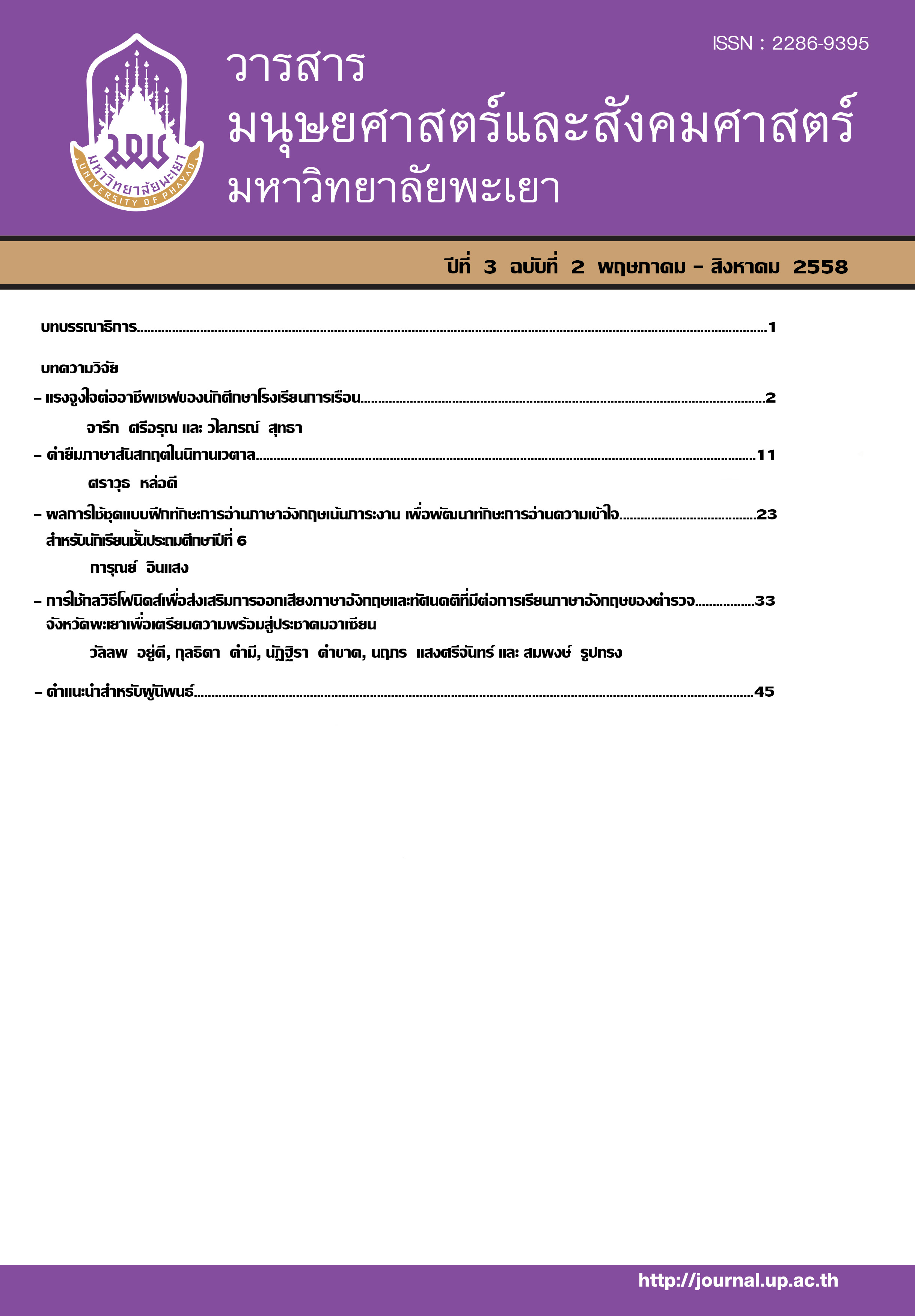Applying Synthetic Phonics Approach to Enhancement of English Pronunciation and Learning Attitude of Policemen in Phayao; Preparedness for ASEAN Community
Keywords:
Synthetic phonics approach, English pronunciation, Learning attitudesAbstract
The objective of this study was twofold, the first one was to investigate the effect of implementing the synthetic phonic on police officers’ English pronunciation and the second one was to study the attitudes of the police officers towards the synthetic phonics instruction. The instruments included lesson plans, pre and post tests, and close and open ended questionnaires. The gained data were statistically analyzed using mean and standard derivation (SD) and that on attitudes stemmed from the open ended questionnaires were descriptively summarized.
The research findings revealed as follows;
With regard to the capability of English word pronunciation, it was found that after the synthetic phonics instruction was employed, the participants gained more mean scores of posttest than that of pretest and the significant difference was at 0.05. In term of attitudes towards instruction, the participants possessed the positive attitudes to the synthetic phonics which was at the high level. In relation to favors and disfavors to the instruction, all of the participants favored the steps of pronouncing sounds, blending words, and varied teaching materials. Contrarily, a few participants relayed they disfavored words with more than one syllable since it was hard to pronounce. And apropos of problems and solutions for the instruction, the main problem was they required much time to practice pronouncing, especially sounds of [th]. There were four main suggestions; there should be much time to practice words with many sounds. Secondly, there should be more words on police officers’ fields. Thirdly, there should be more dialogues relating to policemen’ fields to practice. And the last one was there should be more activities emphasizing meanings of words.
References
Auerbach, E.R. Making Meaning, Making Change: Participatory Curriculum Development or Adult ESL Literacy. [Internet]. the Electronic Journal for English as a Second Language;1995 [cited 2015 April 15]. Available from http://www.teslej.org/ wordpress/issues/volume1/ej03/ej03r8/.
Connelly, V., Johnston, R., Thompson, G.,B. (2001). The effect of phonics instruction on the reading comprehension of beginning readers. Reading and Writing: An Interdisciplinary Journal 14: 423–457.
Ehri, L.C. Teaching phonemic awareness and phonics: An explanation of the National Reading Panel Meta-Analyses. In P. McCardle, & V. Chhabra (Eds), The voice of evidence in reading research (pp. 153-186). York, Pennsylvania: The Maple Press 2004.
Herganhahn, B.R. (1980). An Introduction to Theories of Personality. New Jersey: Prentice Hall.
Holt. G.K. (1995). Teaching low level adult ESL learners.Washington, DC: National Clearinghouse for ESL Literacy Education.
Hussain, A. M. (2010). The Influence of Learning Environment on Learners’ Attitude in a Foreign Language Setting. Strength for Today and Bright Hope for Tomorrow. 10; 573-587.
Johnston, R. S., McGeown, S., Watson, J. E. (2011). Long-term effects of synthetic versus analytic phonics teaching on the reading and spelling ability of 10 year old boys and girls. Springer Science+Business Media B.V.
Jones, Pauline. (1996). Planning an oral language program.In Pauline Jones (ed.),Talking to Learn. Melbourne: PETA; 12–26.
Koda, K. (1999). Developing L2 intraword orthographic sensitivity and decoding skills. The Modern Language Journal, 83 (1); 51–64.
Khajonboon, Namtip. (2010). Using Phonics Method to Promote English Pronunciation and Vocabulary Knowledge of Mathayom Suksa 1 Students. Master of Education, Teaching English. Chiang Mai University.
Konza, D. Phonics. [Internet] 2010 [cited 2015 April 16]. Available from: http://www.decd.sa.gov.au/literacy/files/links/1_3_Phonics_June_2012.pdf
Lefton, Lester A. Psychology. 3rd ed. Massauchusetts: Allyn and Bacon 1979.
LDA of Minnesota. (2004). Decoding Skills. NetNews. 4(3).
Mathew, N. G., Alidmat, A. O. H. (2013). A Study on the Usefulness of Audio-Visual Aids in EFL Classroom: Implications for Effective Instruction. International Journal of Higher Education 2(2); 86-92.
Meemark, M. (2002). An Analysis of Needs and Problems of English for Tourist Police. Master of Arts. MahidolUniverisity. Bangkok. (Thailand). Thai thesis database.
Ocana, H. Vanessa. (2011). Effects of Extended Explicit Systematic Phonics Instruction on Adult L2 Fluency. Master of Arts. Linguistics and English Language Brigham Young University .
Samran, T. (2012). The Development of Pronunciation Skill of the Fricative Sounds Through the Use of the Manual “Fricative Sounds in English” for the First Year English Major Students at Phetchabun Rajabhat University. Journal of Phetchabun Rajabhat. 14; 37-43.
Sucharda, I. (2013). A Development of English Vocabulary Pronunciation Ability of Grade 3 Students through Phonics Poster Materials. Veridian E-Journal. 3; 141-152.
Struck, J. (2007). Adult ESL in the United states. In B.J. Guzzetti(Ed.), Literacy for the new millennium, Volume4 (pp.73-90). Westport CT Praeger.
Tipmontree, S. (2007). The Use and the Problems of English and Intercultural Communication Skills of Thai Tourist Police Officers. Degree of Master of Arts Department of English for Business and Technology .University of the Thai Chamber of Commerce.
Triandis, Harry C. (1971). Attitude and Attitude Change. New York: John Wiley and Sons.
Wyse.D and Goswami.U. (2008). Synthetic Phonics and the Teaching of Reading. British Educational Research Journal, 34(6); 691-71
Downloads
Published
How to Cite
Issue
Section
License
ผู้นิพนธ์ต้องรับผิดชอบข้อความในบทนิพนธ์ของตน มหาวิทยาลัยพะเยาไม่จำเป็นต้องเห็นด้วยกับบทความที่ตีพิมพ์เสมอไป ผู้สนใจสามารถคัดลอก และนำไปใช้ได้ แต่จะต้องขออนุมัติเจ้าของ และได้รับการอนุมัติเป็นลายลักษณ์อักษรก่อน พร้อมกับมีการอ้างอิงและกล่าวคำขอบคุณให้ถูกต้องด้วย
The authors are themselves responsible for their contents. Signed articles may not always reflect the opinion of University of Phayao. The articles can be reproduced and reprinted, provided that permission is given by the authors and acknowledgement must be given.








